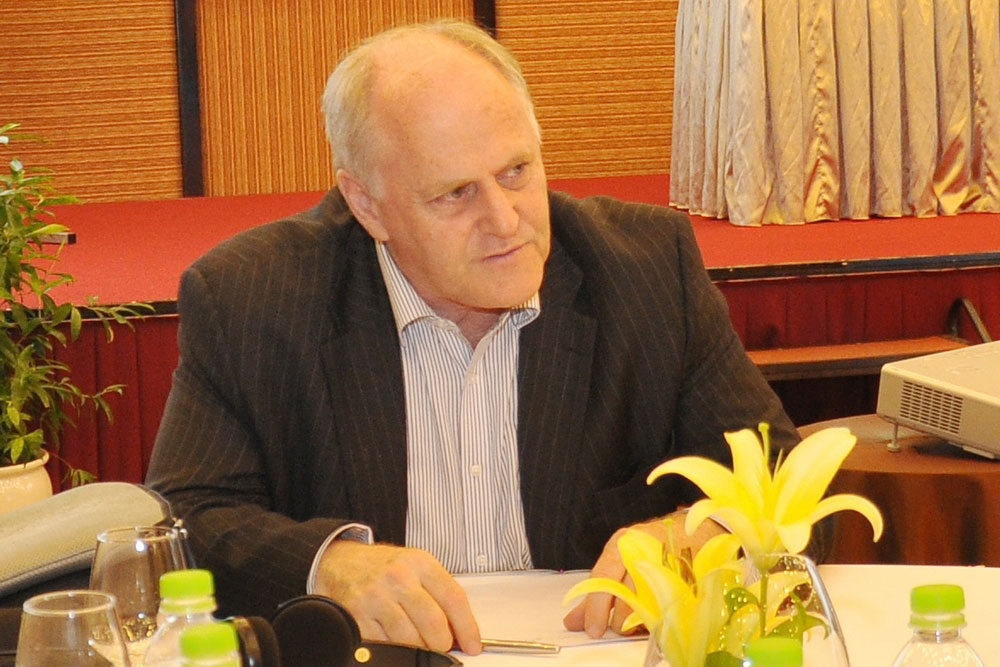Dr Leslie David Sims
Dr Leslie David Sims is a highly experienced veterinarian with a passion for preventing infectious diseases of production animals, especially those that also affect humans. He started his career as a laboratory diagnostician in the Victorian public sector and used these experiences, with Dr John Glastonbury and others, to produce a widely used diagnostic guidebook on pig diseases for the Australian pig industry.
Dr Sims is internationally recognised for his expertise in avian influenza. In 1997, the first global outbreak of H5N1 high pathogenicity avian influenza occurred in Hong Kong - affecting people and poultry. Dr Sims led the local response that culminated in the eradication of that strain of virus. He developed pragmatic and sensible biosecurity measures locally to prevent the return of other H5N1 viruses to live markets and poultry farms, including use of vaccination. He used these experiences as a consultant for the Food and Agriculture Organization of the United Nations (FAO) in multiple Asian countries, including work on World Bank avian influenza projects. He has successfully developed and advocated policies for the control and prevention of avian influenza across Southeast Asia.
Working on diseases at the human-animal interface long before it was referred to as 'One Health', Dr Sims has championed and pioneered this approach. One Health is now regarded globally as the best approach for dealing with complex disease problems. His work in this area included implementing systems for monitoring antimicrobial resistance and use in farmed animals in Hong Kong and co-production of a One Health strategic plan for Vietnam.
Dr Sims has contributed to emergency animal disease prevention and control policy in Australia, especially for foot-and-mouth disease and avian influenza. His expertise and experience with vaccine use overseas, and his deep understanding of the global animal health situation, was invaluable for informing animal health policy development in Australia. His analysis of emergency animal disease vaccines, which could be considered for use in Australia to control a wide range of emergency animal diseases, was a valuable contribution to Australia's Veterinary Emergency Plan (AUSVETPLAN). As a member of the National Avian Influenza Vaccine Expert Group, he co-developed Australia's first documented avian influenza vaccination policy and procedures.
He recently developed the concept of avian influenza vaccination stewardship that has been adopted by the FAO. This aims to enhance use of vaccines and prevention of avian influenza, especially where avian influenza viruses are endemic in poultry. He has also supported Animal Health Australia by providing detailed information on suitable vaccines against avian influenza.
With decades of dedication and unwavering determination, Dr Sims has made an outstanding contribution to Australia's biosecurity through his leadership, expertise and preparedness to share his knowledge freely. His contributions to global disease control, particularly in Southeast Asia, has reduced biosecurity risks for Australia and the region.
Dr Leslie David Sims was nominated by Kathy Gibson and Sam Hamilton from the Department of Agriculture, Fisheries and Forestry.
Watch a video about their work
Video transcript
Introduction
This is the accessible text transcript of a 2024 Australian Biosecurity Awards winner video featuring Dr Leslie Sims.
Transcript
Hello, my name is Les Sims and I've been working in the areas of biosecurity and animal disease prevention for most of my professional career, both in Australia and overseas. In 1997, when I was working in Hong Kong, I was confronted with an avian influenza outbreak causing fatal disease in humans and poultry. The world was worried that it might cause a severe human influenza pandemic, and since then my work has focused on devising appropriate measures to prevent and control this and other transboundary diseases.
Over the next four years, I watched as these viruses became better adapted to domestic ducks in China and soon after transmitted to wild birds. This was followed by multiple devastating waves of intercontinental spread, largely by wild birds, eventually involving all parts of the world except, so far, Oceania. The adaptation of a highly pathogenic virus to wild birds means that the biosecurity lines of separation have shifted from border entry points and farm boundaries. This makes it much harder to prevent incursions of virus.
Over the years, I also learned how effective vaccination can be in providing an extra layer of protection against avian influenza, especially when other biosecurity measures aren't sufficient. It reduces human infections and the need for emergency responses and mass culling of animals. Yet many countries are still reluctant to use vaccination, and over the past decade I've been working internationally to change attitudes towards use of vaccination, with some success.
In my work across Asia, I also watched and learned as severe animal diseases overcame existing biosecurity measures and became entrenched. Australia now faces much greater threats from diseases such as avian influenza, African swine fever, lumpy skin disease and foot and mouth disease. My early career as a veterinary pathologist taught me the value of high-quality diagnostic services, and of sharing accurate information about animal pathogens and disease. This work underpins all surveillance and disease management programs.
The desire to share my experiences was the driver behind the guided Pathology of the Pig that I produced with John Glastonbury and other expert authors. I continue to share information on biosecurity and disease prevention through many avenues globally and with my colleagues in Canberra, including Kathy Gibson and Sam Hamilton, my nominees, who I thank for their recognition. My hope is that Australia can rise to the many new biosecurity challenges it faces. This includes seriously considering vaccination against avian influenza, to reduce devastating losses to our iconic wildlife, and to prevent diseases in poultry. I'm deeply honoured to receive the David Banks Biosecurity Lifetime Achievement Award. Thank you.
Photos
Recognising Australia's biosecurity champions
Learn more about the Australian Biosecurity Awards







